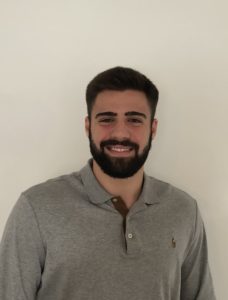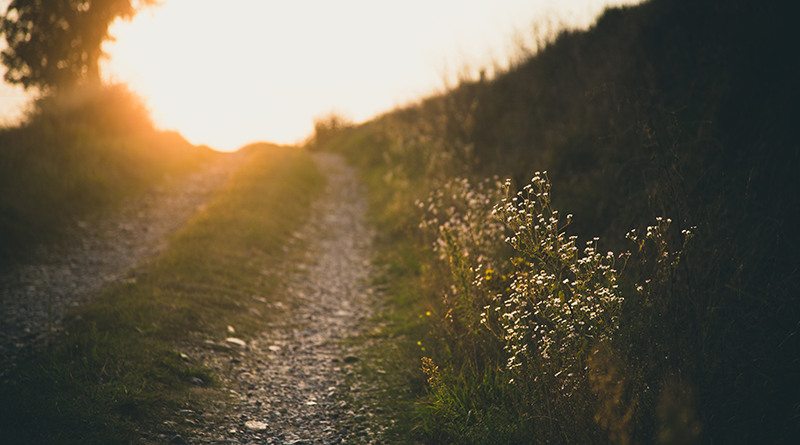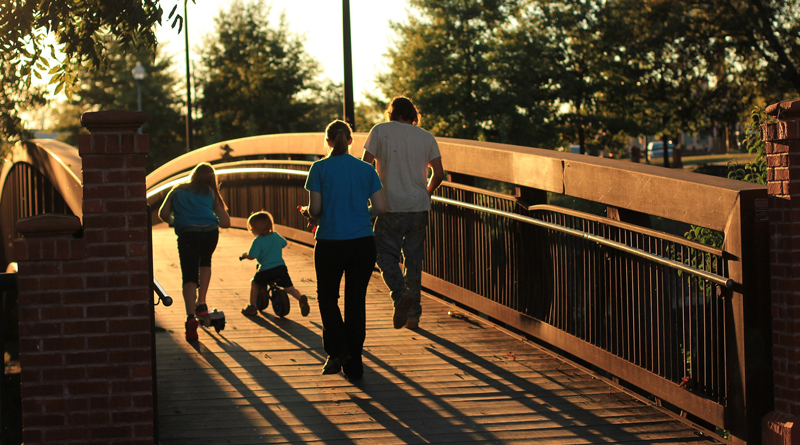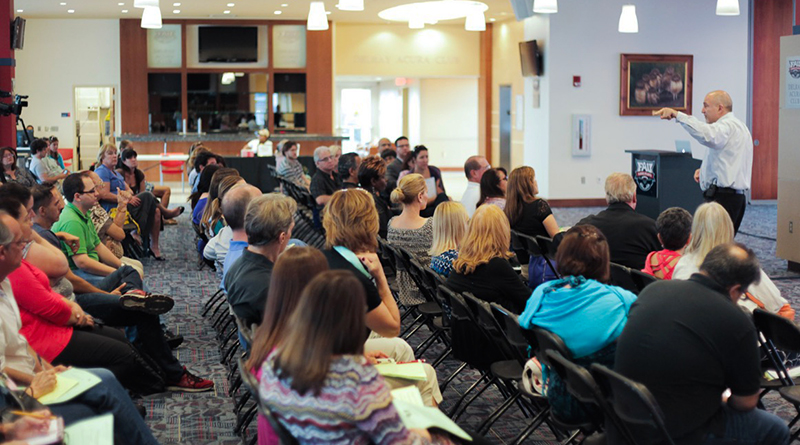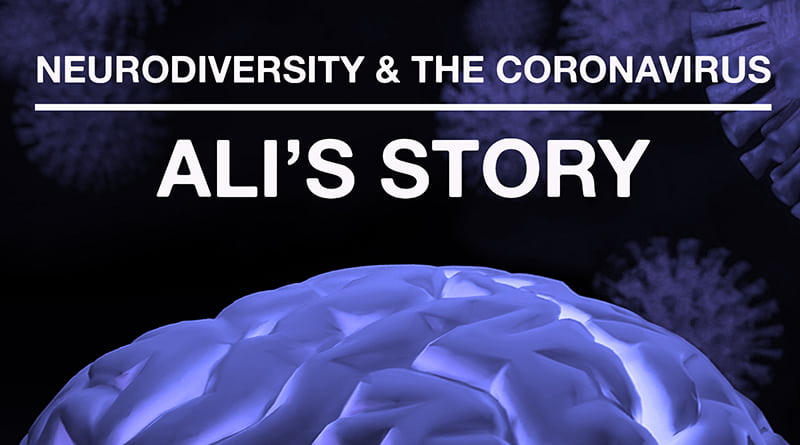
The Coronavirus Pandemic: Ali’s Journey With ADHD & OCD
The Pandemic: Ali’s Story:
About the author:
“My name is Ali. I’m a 4th year student at Florida Atlantic University majoring in Biology and aspiring to become a physician. My goal at the moment is to build my resume and get into medical school. I have a passion for working in fast-paced work environments while under pressure and putting a smile on people’s faces while I do so. I also lived 5 years of my life in Lebanon from ages 10-15, where I learned how to speak, read, and write the language of Arabic and learned so much about my culture as well. I have been interning at Different Brains for a couple of months now, where I’m working on an ADHD project, being that I was diagnosed ADHD at 7 years old. I want to share my story and help others with the tools that I use that have helped me overcome many of the battles along the way. I am also working on a research project and on the social media team for Different Brains.”
Before The Pandemic:
Q: Describe your everyday life before the pandemic.
A: My everyday life, before the pandemic hit, was pretty much made up of school, working out, friends (including my girlfriend, for sure), along with watching movies here and there, reading my books, and I read five to ten pages a day.
School: I would go to FAU (Florida Atlantic University) in Boca Raton every day of the week. My classes were scattered throughout the day. I would also go to supplemental instruction hours and to free tutoring hours to learn more about the class I went through.
School & Classes:
Classes were a little shorter and packed with a lot more information and with hundreds of students, so I would go these supplemental instruction classes, which is free tutoring and extra review, and tutoring sessions with some of my other friends, which would be more socially interactive with people. [It was] closer, [because there were] less people, you could ask more questions, it was great! I learned my information much better. I’d eat there as well at the cafeteria or Chick-fil-A.
I spent most of my day at FAU, and then I’d commute back [home], and then I’d end up working out at YouFit: the gym near my place, at night. I’d usually do late-nights over there because it would close at midnight and I’d work out from either 8:00pm, 9:00pm, 10:00pm (I’d start around those times) and work out for an hour or two, and that’s how I’d end my day.
I’d come home, shower, I’d have a little snack, and then I’d go to sleep. Unless I hung out with my girlfriend, I wouldn’t work out. We’d watch a movie when we’d hang out, and that would be a rester, unless I had an exam. Sometimes I wouldn’t be able to hang out with her or work out. Exams: I’d put a lot of time into it.
Work Life & Interning:
I would also work at a restaurant called, “Papa’s Raw Bar”, before it closed (due to COVID-19). I used to pick up shifts there randomly. I wasn’t on the schedule permanently due to my shadowing and volunteering.
I’d work a night shift, usually on the weekends. I’d usually choose between Friday, Saturday, or Sunday, or maybe one weekday if I’m lucky enough, depending on my school schedule. People would always want to get covered, you know? It’s very common for people to want off at the restaurant I worked at, and through the shift’s app, I’d see that and pick it up, I’d get approved, and I’d work that day. My schedule was very customizable.
Along with shadowing over here at Broward Health Imperial… I usually shadow (following and observing someone to learn what it is like to perform a specific job at a workplace) Dr. Shehnaz Hassan, and she’s a hospital internist for general medicine. She used to send me her schedule every month and I’d choose what days to come by. I used to choose to come by for an hour, four hours… whatever days and whenever I wanted. So, it was very customizable.
Volunteering as well. I would have a set day. I’d go there, and sometimes, if I couldn’t make it, it would be okay with them.
I was trying to get my foot into research as well, but a lot of things were just put on pause before the pandemic hit, unfortunately. But, thankfully, I got this internship at Different Brains last-minute, which was amazing because now I have something to do and look forward to, but it’s crazy: the whole pandemic hitting, and all my routine changing. It’s been stressful. Not only do I have a new internship, but I have a whole new routine a school.
Q: It sounds like no two weeks were exactly the same for you.
A: Exactly, exactly. The only things that varied were shadowing and work, and those were things I wouldn’t have to stress about. I’d just have to show up and do my thing. It wasn’t really something I had to prepare for, so it wasn’t that big of a deal, but it still was varied. But then, there was a huge standard when everything was cancelled, and I had to stay at home. Next thing you know, I have a new internship. The new internship is a lot to take in and now I have more time for it, which is awesome.
School & Work Come to a Halt:
Q: Describe how you initially reacted to COVID-19 and the social distancing:
A: It was a weird entry… The whole subject really entered my life in a very, very odd way. We just entered spring break, it was great, and we were off.
In the middle of spring break, they said, “Oh no… no more classes in person—everything has to be remote.” It just felt like spring break was extended in a sense, you know? It’s kind of hit me in a weird way. It was like, “Wow… everything’s going to change, I’ve got to focus on my new routine, what’s going to happen?” I didn’t really know what to expect: how tests are going to be online, how to study through online, is my gym going to close? Could I shadow? I even asked my doctor that I shadow, “Can I come?”, and she told me, “No, we’re trying to minimize personnel and we want to minimize contamination”. Everything just came to a halt…
It was something hard to take, but you know, I think of it like this: adversity builds you as a person, and when everything comes back to normal, it’s going to feel so good! These troubles make you stronger… and I’m not upset… but I have to endure… it really humbles you and makes you look around.
Structure & Meeting Up With Others:
Q: In what ways did your life and schedule change as a result of the coronavirus?
A: It was very day-to-day with college. I’d do some work here, meet up with some friends—I always met up with my friends—that’s the thing. My friends and my classmates, and that’s who I’d walk around with on campus and work with. Say I had statistics, I’d be with my statistics classmates. We’d do our work together; I’d say, “Bye”.
Next thing you know, I have work, I have chemistry, I’d meet up with my classmates there, we’d do our work together, and we’d maybe end up going to our supplemental instructions class and learning more about what we just saw in class. Then, I’d come back home, I’d get to relax a little bit, depending if I saw my girlfriend or not. Or, if I had an exam, I’d stay at the campus all the way until night… study, study, study, and I wouldn’t even go to the gym, which I would usually do if I had no exam. That was basically it—that was my weekdays.
On the weekends, I’d maybe hang out with my boys, my friends, and my girlfriend’s friends. We’d hang out, do our thing, relax, maybe I’d still have to study, shadow, [and do] volunteer work, or at the restaurant. Like I said, it varied, but along those lines.
Routines, Working Out, & Different Brains:
Q: What have you had to do in order to adapt to these circumstances?
A: I’ve replaced my calendar and routine with the whiteboards and wallpapers. I still have it all set up around me. I put alarm clocks here and there on time of what I have because I can’t really go somewhere and bump into my friends, and some of my friends would give me a reminder: “Ali, we’ve got to do this,” but now it’s all up to me, so now I’m all on my own putting everything together. Obviously, with the whole change, there’s new software to use, new apps to use, new sites to use, to adapt to these remote online instruction classes… In person is way easier: you can ask questions directly; it’s more intimate, in a sense… there’s more of a connection, in my opinion. It’s not through a screen, but we have to adapt–it’s a new world—technology is taking over…we’ve got to be grateful for what we have and look on the bright side of things.
I now go for jogs for 20 to 30 minutes every other day and I’m getting some sun as well. I always like getting sun. Vitamin D is very good. I’m doing a couple of push-ups here and there; whatever I can do to get the blood flowing. I do have more time to read my books, because when you commute to FAU, it’s a half hour drive there and a half hour back. [I] go to the gym, that’s fifteen minutes there and fifteen minutes back… so technically, we do have more time to do what we want to do.
With Different Brains, thankfully, I have my ADHD project, my transcriptions, for example this with you (Julia), I’m working on new things, so that kind of helps me do extra things, but it’s different not going somewhere more physically, rather than just staying home. Home has become work, become fun, become everything, and it’s very different.
Q: How does having ADHD and OCD affected the way you are dealing with COVID-19 or vise verse?
A: I have a little bit of OCD–I wouldn’t say I have full-on OCD. I see myself having moments of OCD, and I think I get that from my mother and father. They both have major OCD, and I think being around them, I kind of got that. But the main thing I have is my ADHD. It’s annoying, because with ADHD, I feel like [someone] always wants to be on the move and have structure to [their] day.
Staying at home is tough for someone with ADHD because it’s the hyperactivity. You have to please that… even with inattention and impulsivity—those are the three categories: hyperactivity, inattention, and impulsivity.
Struggles of Having ADHD:
It’s just good to have structure on your day-to-day and usual routine to relieve that stress and anxiety that ADHD comes with, because it’s tough to do your daily operations and be productive every day, unless you have specific routines… we’re always inattentive, we procrastinate, we can’t stay on topic. We’re all over the place. We have too many tabs open, basically. It’s like a browser with too many tabs open, you know? When you have a specific organizer, the tabs will be organized.
Even diet and sleep play a role. I try and stay away from sugary things. For example, anything that gives me energy that shouldn’t be giving me energy. All of that plays a role in my day-to-day operations.
I’m still hyper, and I have these moments where I’m just full of energy! It’s when I’m not supposed to, you know? I’ll walk into a classroom and all I’ll want to do is just talk and laugh sometimes.
Being home is tough, but it’s a humbling experience and it’s going to take time for everything to come back to normal.
Dealing With the Coronavirus;
Q: What coping mechanisms are you using in order to deal with these strange times?
A: I’m reading, doing my Different Brains projects. I’m just trying to be productive when I feel stressed out. I just try to be productive: what is on my schedule? I look at my calendar, write down a to-do list, create structure (a routine), and that’s the main thing for me: even calling my mom, sisters, and dad. I talk to them for maybe half an hour, or my girlfriend. I just have a little conversation with them to relieve some stress because I want to release that energy that ADHD has. I try to do that as much as I can, I try to listen to music, I watch movies, I just try to cope with what’s going on. I know one day; everything will get back to normal. Then, we’ll be okay.
Being on the Move:
Q: What have you learned about yourself and the world around you from these circumstances?
A: I like being on the move; I like being hands-on. I’ve realized that if I want to go and study, I like going somewhere. Whether it’s a library or some random building, I just want to hop in my car and go somewhere. I have no idea why; I think it’s just with my ADHD playing a role wanting to go somewhere… I want to be on the move.
I feel like home has been too much for me. I don’t know if I’m just getting bored of it, and I’ve noticed that I’m thankful. I kind of like the way I created a new routine and schedule for myself because not only did I do this through the pandemic, but I created a new schedule based off me staying home.
Adversity & the Coronavirus:
So, say we come back to normal and the pandemic goes away, and there’s a moment where we have to go back home again. Say there’s a hurricane (where we live), say there’s another pandemic—you never know what could happen; I am ready. I’ve already gone through this experience. You’ve got to look at that side of things—you approach a whole new thing.
Adversity builds you as a person, and I think it’s cool, you know? It was kind of tough at the beginning, but I did well. I finished off strong with the help of my friends, including my classmates, who also were going through the same thing. I made sure I was in contact with them the whole time. I texted them a lot, I called them a lot, I didn’t lose that connection with them as well…
What Different Brains Does For Ali:
Different Brains is an amazing organization. I’ve been writing a lot and I’ve been focusing on new things, and it’s been a lot to take in and absorb… It’s great. It’s a lot of knowledge and its awesome stuff, and I’m thankful for what’s going on.
I learned a lot of new things about myself. When things come back to normal, I can’t wait to create a new routine based off everything new I’ve developed.
Always Look On the Bright Side of Life:
Q: What advice would you give someone like yourself that’s dealing with these same situations?
A: The advice I would give is, look at the bright side first. Look at the good side, look at the positive side of things: how it humbles you, how you will develop new skills. Think of it like this: you’re back as a little kid during summer, and there’s nothing to do… you can look at it in a goofy manner, but just look at the bright side of things: that will give you motivation to sit down and see what’s missing. What are you going do, how are you going socially interact with your friends? FaceTime them, Skype them, Zoom call them, text them. How are you going do your productive things, such as working out or studying or reading? Create a specific schedule or routine based off your new day-to-day structure.
Being Strong & Seeking Help From Others:
Seek help from others—help is key! You got to talk to others about what you’re dealing with: your troubles. For example: this call. Me (Ali) and Julia relate on the same issues: the same subject. This gives me motivation and confidence to move forward. We both are dealing with the same thing, we both are happy with what we’re developing, what skills… we’re moving forward. It’s good to have another person or entity to talk to about these things.
Sit down, be strong, push through. It’s going to be tough, but not everything’s easy in this world. You’ll make it, it’ll be easy, everything will come back to normal, and it’ll make you stronger—what doesn’t kill you makes you stronger, right?
For anyone who’s neurodiverse, there’s always a way. Just approach it like how you approach your usual day-to-day operations, but with a new set of day-to-day structures, and seek for help.
Story by: Ali
Transcribed by: Julia Futo
Interviewed on: May 7th, 2020
Julia Futo was born on August 5th, 1999, in Fort Lauderdale, Florida. She faced difficulties early on in life with trying to perform everyday tasks. Before she was five years old, she was diagnosed with two learning disabilities: Encephalopathy and developmental coordination disorder (DCD). She struggled in school for a long time, but that changed when she took journalism in high school and learned how to become an advocate. She is currently in college and hopes to help others find their voices.

